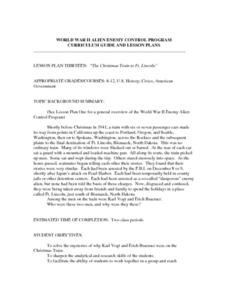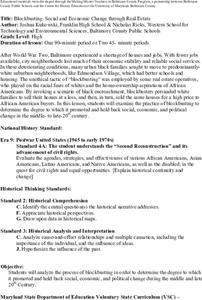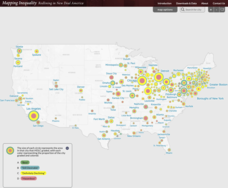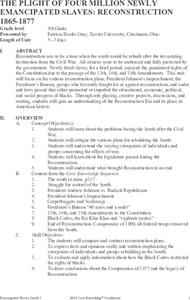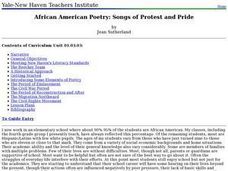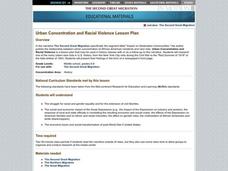Curated OER
Have Minorities Gained Acceptance
Students cite evidence gathered from magazines about how much Blacks are accepted into the mainstream of American life. They support their conclusions by writing an answer to an essay question.
Curated OER
Defining Moments From the Past: Japanese American Internment
Students conduct a mock Congressional Hearing to decide whether or not Japanese Americans who were sent to internment camps during World War II should be provided financial restitution. They research and create a time line of events...
Curated OER
What is a war criminal?
Young scholars read the story Former president denies war crimes. They then read three different situations and discuss the situations. Students draw up plans for fair war, young scholars are divided into two equal halves. The...
Curated OER
Guantanamo Bay
Students are divided into small groups, they work through questions in their groups. They read the story UK terror suspects to come home. Students are then introduced to the phrases' 'human rights' and Geneva Convention and students...
Curated OER
The Christmas Train to Ft. Lincoln
Learners solve the mysteries of why Karl Vogt and Erich Braemer were on the Christmas Train. They review the definitions of the terms constitutional, human rights, due process, discovery, and the writ of habeas corpus. They review the...
US House of Representatives
Keeping the Faith: African Americans Return to Congress, 1929–1970
The third lesson in a unit that traces the history of African Americans serving in the US Congress examines the period from 1929 through 1970. After reading a contextual essay that details the few African Americans elected to Congress...
Facing History and Ourselves
The Legacies of Reconstruction
The final lesson in the seven-resource Reconstruction Era collection examines the legacies of Reconstruction. Class members investigate why the period has been called an "unfinished revolution," "a splendid failure," and "the second...
K12 Reader
An Interview with President Lincoln
What would you ask Abraham Lincoln if you had the chance? Class members draft interview questions for the 16th U.S. President, and imagine what his responses would be.
K12 Reader
Elegy for Lincoln: Walt Whitman’s Poem
Walt Whitman's "O Captain! My Captain!" is one of the most famous and emotional tributes to Abraham Lincoln. Guide readers through the evocative elegy with a reading comprehension worksheet, complete with the poem's text and a...
K12 Reader
Abraham Lincoln Bio Poem
Everyone knows about Abraham Lincoln as a historical figure, but what was he like as a person? Young historians complete a biopoem about Lincoln, including his character traits, his relationships, his fears, and his needs.
DocsTeach
Analyzing a Letter from Jackie Robinson: "Fair Play and Justice"
Jackie Robinson was more than a baseball legend; he was an activist, too. An interesting resource explores Robinson's time in the military using primary sources. Scholars examine the racially inspired event that led to a court martial...
Center for History Education
Blockbusting: Social and Economic Change through Real Estate
"Redlining," "Blockbusting," and "White Flight" may not be terms familiar to young historians. Here's a lesson that introduces middle schoolers to these terms and the actions associated with them. Class members examine a series of...
Center for History Education
African Americans and the Democratic Party
Why did African American voters switch from the Republican Party to the Democratic party during the Depression Era? That is the question young historians attempt to answer as they study primary source documents from the period. The focus...
American Institute of Physics
African American Physicists in the 1960s
Physicists Herman Branson and Tannie Stovall provide young scholars with two very different perceptions of the status of African American physicists in the 1960s. After reading and comparing the bios of these two men, class members read...
Anti-Defamation League
The Road to Brown
As part of the study of segregation in U.S. schools, scholars research and create a timeline of events that led to the historic Supreme Court case, Brown V. Board of Education. Groups research a topic or event that led to the decision,...
National Woman's History Museum
Create your own Women’s History Museum
Celebrate Women's History with a museum display. Divide the class into seven groups and assign each a different historical topic/time period. Each group member researches a different woman of that time period and creates an exhibit that...
University of Richmond
Mapping Inequality: Redlining in New Deal America 1935-1940
Redlining—or the practice of racial discrimination in housing loans—directly led to today's segregated living patterns in America. Using data from the federal Home Owners' Loan Corporation, classmates visualize the impact of policy on...
US House of Representatives
Black Americans in Congress Speak Their Mind
To conclude their study of Black Americans in Congress, groups select a statement made by one of the Members, examine the Member's profile on the provided link, and create a display that includes state represented, years of service, an...
Curated OER
The Plight of Four Million Newly Emancipated Slaves: Reconstruction - 1865-1877
Students study the Reconstruction Era after the US Civil War. In this Reconstruction lesson set, students examine the problems that were encountered by the South after the Civil War, look at different plans for Reconstruction, and...
Curated OER
American Justice on Trial
Young scholars role play a trial in which they consider if the United States government violated the rights of Japanese Americans after Pearl Harbor.
Curated OER
African American Poetry: Songs of Protest and Pride
Students are introduced to various time periods in history in which African Americans wrote songs and poetry to cope. In groups, they travel between different stations to listen or read poems and music from the Civil War period, Civil...
Facing History and Ourselves
Emmett Till: Examining the Choices People Made
The choices made by Roy Bryant and J.W. Millam, the men who murdered Emmett Till in 1955, are usually the ones people ponder when they examine the case. But other individuals made choices that contributed to the event and its subsequent...
Curated OER
Urban Concentration And Racial Violence
Students investigate the struggle for racial and gender equality and for the extension of civil liberties, the social and economic impact of the Great Depression, and the economic boom and social transformation of post-World War II...
Curated OER
Government: War Powers Limitations
Students examine historic examples of authority during wartime. They interpret the Fifth Amendment. They debate the merits of the Patriot Act.




